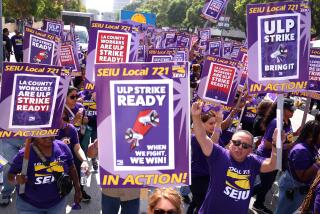A Time of Uncertainty for Many in the News Media : Bay Area Newspaper Talks Continue as Both Sides Try to Avert Strike
- Share via
SAN FRANCISCO — Union negotiators saw enough progress Friday to waive two walkout deadlines and to continue talking into the night in the hopes of averting a strike at two San Francisco newspapers.
“We have stopped the clock,” Dawn Garcia, a San Francisco Chronicle reporter and union spokeswoman, said shortly after 6 p.m. “The parties need more time to work on an extensive list of hard economic issues.”
Added management spokesman Jesse Knight: “It could be a long night.”
At 8 p.m. Garcia held a briefing at which she said that the two sides remain “fairly far apart” but added that “both sides have agreed to stay at the bargaining table until they get a contract or know that they cannot get a contract.”
Federal mediator Ruth Carpenter joined the talks shortly before 10 p.m., Garcia said later. “We still want to be done tonight, one way or the other,” she added.
The unions remained poised to strike if a settlement eluded negotiators.
About 4,500 workers, represented by 10 unions at the Chronicle, the San Francisco Examiner and the San Jose Mercury News, have worked without a contract since their three-year agreement expired in February, but only the San Francisco papers have been targeted for a strike.
The day began with a yawning gap between proposals offered by the union and management negotiators holed up at the Sir Francis Drake Hotel.
Management’s initial offer, consisting of a plan to give two annual bonuses of $80 per worker in lieu of permanent raises, was denounced by Northern California Newspaper Guild president Douglas Cuthbertson as “a suicide note,” people privy to the negotiations said.
Union officials demanded a one-year pact that would raise salaries 20% and give workers a four-day work week and six weeks of vacation.
“You tell me which of the proposals is more outlandish,” said one Chronicle reporter.
Even as the union’s self-imposed 5 p.m., then 6 p.m. walkout deadlines came and went, Bay Area retailers braced for a possible strike. Competing publications also mapped plans to fill the void should one occur.
The Chronicle is the area’s largest newspaper with circulation of 570,000; the Examiner sells about 140,000 copies a day.
“We’re certainly worried about a strike,” said Kathy Stauffer, vice president for advertising of The Good Guys, a big electronics chain. “Thanksgiving weekend is one of the biggest times of the year for advertisements and shopping.”
Observers said large department stores such as Macy’s and the Emporium would be particularly hard hit by a strike. A Macy’s spokeswoman declined to comment and Emporium officials didn’t return phone calls.
“The department stores have been living on sales and promotions. They depend on newspaper ads to pull in traffic,” said Gene Farb, an owner of Whole Earth Access, a Bay Area chain that sells upscale merchandise at discount prices.
A strike would further dampen the local economy by slowing real-estate sales and depriving up to 4,500 workers of their paychecks.
Knight, a spokesman for the San Francisco Newspaper Agency, which publishes the Chronicle and Examiner under a joint operating agreement, said, “we can publish” in the event of a strike “but the ultimate question is whether we can deliver.”
San Francisco Police Chief Frank Jordan, in a letter to an official of the Newspaper Guild, said the department will “maintain order” in the event of a strike but will “under no circumstance provide guards or escorts to any individuals acting in a strikebreaking capacity.”
Robert C. Maynard, editor and publisher of The Tribune in Oakland, observed: “We have ample opportunity to expand our press run and our page count” if a walkout cripples the competition.
The Tribune is one of about 20 newspapers in the greater Bay Area that likely would gain circulation and advertising from a strike; others include the Contra Costa Times, the Peninsula Times Tribune, the Santa Rosa Press Democrat and the Marin Independent Journal.
Still, Maynard said, “It is hard to believe that anybody would be so foolhardy as to strike a paper without exhausting negotiations.”
Friday’s “byline strike” in which writers withheld their bylines from stories to dramatize their displeasure with the pace of the talks was only partially effective.
The morning Chronicle accommodated the wishes of its writers; even the paper’s trademark column by Herb Caen ran without his name. The afternoon Examiner permitted its reporters to drop their bylines. But, over union objections, the paper reinstated those of its columnists and critics.
More to Read
Sign up for Essential California
The most important California stories and recommendations in your inbox every morning.
You may occasionally receive promotional content from the Los Angeles Times.














